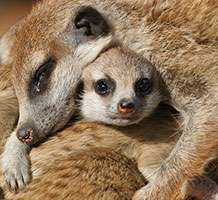Are flexible parents adaptable parents?

(Phys.org) —The flexibility of parental behaviours to respond to changes in behaviour of their offspring may actually constrain the ability of parents to adapt to changes in their wider environment.
This is the paradoxical conclusion of a new review article by Dr Nick Royle, Dr Andrew Russell and Dr Alastair Wilson from Biosciences at the University of Exeter, published in a special issue of Science on parenting.
Parenting behaviours, such as the provisioning of food by parents to offspring, are highly responsive to changes in environmental factors. These include not only climatic (e.g., temperature) and ecological (e.g., food availability, predators) factors, but also social factors, in the form of partner and/or offspring behaviour.
Social environmental factors differ from non-social factors because parents and offspring both contribute and respond to the social environment they experience. This means that parent and offspring behaviours become inter-dependent (co-evolve) as the most successful parent-offspring combinations proliferate.
However, this responsiveness to each other also means that behaviours are not free to evolve in the direction that best serves the individuals involved, which could constrain the ability of parents to adapt to rapid changes in non-social environmental factors such as food supply.
According to Dr Nick Royle, one of the authors of the review, "this is analogous to organizations such as the United Nations responding to global crises, where the ability of the UN to respond effectively is likely to be constrained by compromises that have to be reached as a result of conflicts of interest among member states".
"Given the current rate of human-induced environmental change it is important to quantify how individuals vary in their response to changes in both social and non-social environments in order to understand both how parenting evolves and how organisms adapt to environmental change".
When individuals modify their behaviour in response to changes in environmental factors, this is known as plasticity of behaviour.
"Many scientists already have data that would help to address these issues, but just haven't applied suitable analyses. One of the aims of the review is to encourage more work in this area. Doing so will help us understand how plasticity contributes not just to the diversity and evolution of parenting behaviours but, more generally, as to how species respond to environmental change", says Dr Royle.
The article 'The evolution of flexible parenting' was published in the journal Science.
More information: "The evolution of flexible parenting." Nick J. Royle, Andrew F. Russell, Alastair J. Wilson. Science 15 August 2014: Vol. 345 no. 6198 pp. 776-781. DOI: 10.1126/science.1253294
Journal information: Science
Provided by University of Exeter


















